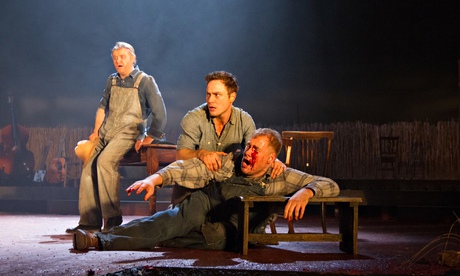
It's time for a new adaptation of John Steinbeck's novella. The author's own version, which is also due on Broadway this autumn, is pushing 80 and belongs to another era. It's not enough to sift dialogue from description any more. Theatre has moved on.
Steinbeck's storyline, however, remains as affecting as ever. George Milton and Lennie Small, two farmhands traipsing California, rank among American literature's greatest friends. Dyfrig Morris plays Lennie with blankness rather than the standard-issue gawp and Henry Pettigrew flicks between fondness and frustration as George, eager to ingratiate himself with other colleagues but encumbered by loyalty.
For a play about bearing burdens with dignity, there's an awful lot of dramatic dead weight. Director Mark Rosenblatt says he wants to explode the text. The impulse is right – not least in importing the singer Heather Christian, the distinctive, husky sound of Mission Drift, to provide, as Curley's wife, Depression-era song. Rosenblatt will need more dynamite, however. Christian is underused as background noise: mostly providing coyote calls and drawn-out double-bass. When her music's integrated, as when Curley, the rancher's son, played by John Trindle, launches a percussive attack on Lennie, the show splutters into life.
That's what's missing here – life. Max Jones's handsome panoramic set – barley and blue skies dominated by a working wooden windmill – feels plastic, without a sense of everyday backbreaking fieldwork. There's a testosterone shortage, too, without which you never feel the itch of impending catastrophe.
There are some gains. Christian, in particular, is revelatory as Curley's nameless wife. The book, in part, shows her through others' eyes, as a temptress to be avoided. Here she cuts a lonely figure – the only woman for miles – whose search for company gets mistaken.
But this is all too little to justify nearly three hours of stage time. The book's a 100-page sliver: it's quicker and richer just to read it.
• Did you catch this show – or any other recently? Tell us about it using #gdnreview

